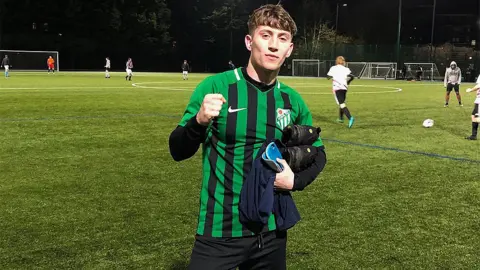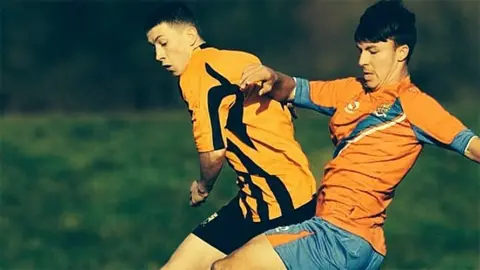Football academies: A failed dream 'sends you to a dark place'
 Alfie Cain
Alfie CainWhen Chelsea fan Alfie Cain was given the chance to play for the club's academy at the age of eight, it was "a dream come true".
But that dream didn't last for Alfie, who was released by Chelsea and then by his next club Barnet - leaving professional football at the age of 18.
It's a familiar story. There are an estimated 1.5 million players playing organised youth football in England at any one time - but only around 180 of those will make it as a Premier League professional.
"You're labelled as a footballer, you walk around your area and it's all 'football, football' and it's great," Alfie tells Radio 1 Newsbeat.
"But then suddenly it's not so great, you feel like a complete failure and it sends you into a dark place."
Now 25, Alfie is performing a one-man play called Dropped, based on his own and his friends experiences, which explores the darkness and pressures young men go through trying to make it as professional footballers.
'It knocked the stuffing out of me'
It was after a hot-streak of scoring five goals against an Arsenal development team that Chelsea scouted Londoner Alfie.
When he experienced a health problem aged 11, Chelsea helped him get fit, but then released him from the club. He moved to Barnet where he "had a great time" for four years.
"They let me go when I was 18 and I didn't know what else I wanted to do."
Six months after being released by Barnet, it "really kicked in" that his professional football dream was over.
"It knocked the stuffing out of me," he says.
"I was angry and felt like I was owed something - which I obviously wasn't."
 Alfie Cain
Alfie Cain"I'd never really drank before because of football, and then I started going out.
"I was getting into fights the whole time, which got me into a lot of trouble."
Alfie ended up getting arrested after being in a fight, and while on bail felt he had to choose which path he was going to go down.
"I tried to sort myself out. If I carry on doing this, I'll end up being a tearaway and that's not what I want to be."
He chose to study drama - a subject he'd enjoyed at school - and after sitting with eight of his childhood friends, he wrote Dropped.
"I wrote down all these experiences and put them into one character. So it's a generalisation of what young men go through when trying to make it as a professional footballer; things like sexual abuse, depression, dad pressure, community pressure and racism."
"Even now, I struggle with depression. I know how to deal with it but there have been weeks where I wasn't able to get out of bed for five days."
Support for young players
Alfie feels education is important when it comes to support for players in academies.
While he was with the academy, he studied for a qualification in sports science - something he says he had "no interest in" - and says he'd like to see academy players offered a better range of subjects to help them prepare for life outside football if things don't go to plan.
"So many people are interested in music or business, let them study something they enjoy so they're not left completely dejected."
He also thinks clubs need to be better at supporting released players, with Alfie saying he was not contacted again after being released by his clubs.
"It's just brutal. Once you're not good enough any more, they let you go. And that's that."
Allow Instagram content?

To help others, Alfie has recently set up a website which works like a forum for young players who are released.
"It's a safe space where you can be anonymous and just talk, share experiences and then those who've been in those situations can give advice."
"Men in general struggle talking about their problems, especially in football because they're shown as gladiator type characters that can't be broken."
Despite all he's been through, Alfie says he does not regret the past because it's made him more "resilient".
"I always liked the crowds and without football, I wouldn't have been able to write this piece."
"I feel the stars are aligned in weird ways sometimes. Yes, I'm bitter about football and it's always going to be in the back of your mind, but, it taught me a lot."


